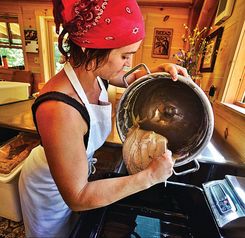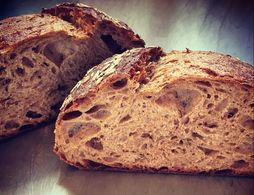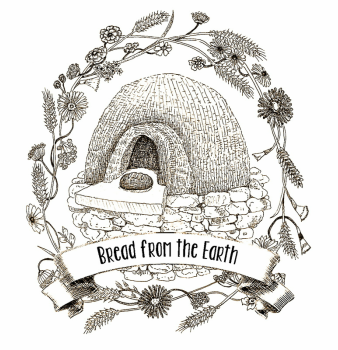My mission is to feed my community wholesome and delicious bread,
while supporting local organic farmers and producers.
For this reason, all of the flour in my bread is organic and sourced as locally as possible. Most of the flour I use is grown right here in Vermont, or as close to home as I can get it. I heat the oven using slab wood from local saw mills, which supports our local fuel economy and utilizes our community's rich resources.
Why I Bake Bread
|
Why I Bake Sourdough Bread
|

My name is Sarah, and I have always loved to bake. My relationship with bread began with my Grandma and our Friday ritual of baking challah in her cabin on the lake in Maine. She taught me all those years ago that fresh bread is worthy of the labor it requires, and that it tastes like the love that goes into it.
Before moving to the West Townshend area in the summer of 2014, I worked in the bakery at Earth Sky Time Community Farm in Manchester, VT. Among the infinite number of things I learned there were an appreciation for really good artisan bread and a taste for sourdough. I also fell in love with the magic of wood-fired ovens. While I certainly love to bake lots of other things, bread has become my passion. Good bread nourishes our bodies and souls. When I moved to the West River Valley, I began to try out baking bread in the outdoor cob oven that the community had built at the West Townshend Country Store (read about the story of our oven here). The rustic oven came with many challenges, but even more rewards. In 2016, after two years there, I could no longer meet the community's demand for good bread using the incubator kitchen at the West Townshend Country Store. Which meant it had done its job. With the help of lots of incredible friends and family and everyone who contributed to my Indiegogo campaign, I was able to build a beautiful new wood-fired brick oven and bakery space just a mile and a half from the center of West Townshend. I began baking in this oven in the spring of 2017, and the results so far have been exciting and inspiring. As I continue to learn to work with the idiosyncrasies of the oven, the weather, and my own heart, I feel so much support from the beautiful community around me that encourages me to keep doing what I love. It is my commitment to prioritize the quality and sustainability of the bread I bake and the ingredients I use. Thank you for your support in this endeavor! Photo at top of page by Kristopher Radder
Want to learn more about my other life as a birth doula and midwifery assistant? Click here!
|

Natural leavening (AKA sourdough culture, wild yeasts, or mixed culture leaven) is critical to the quality of the bread I bake. These terms all refer to the leavening agent used to make the bread rise. Historically, sourdough culture was the only rising agent available to bakers. These cultures - in the form of bits of dough saved from each batch of bread - were passed down through the generations from one baker to the next along with the knowledge of how to use them.
In just the last few hundred years commercial yeast was developed out of the byproducts of alcohol fermentation. While commercial yeast allows for fast and consistent rising, it does not provide all the benefits of the longer sourdough fermentation process. In contrast to commercial yeasts (or "isolated yeasts" as Sandor Katz - the fermentation god - calls them), sourdough culture is a symbiotic community of bacteria and yeasts that work together to make the bread rise, while simultaneously enhancing its flavor and nutritional value. Sourdough cultures from around the world (and even around the neighborhood) can vary drastically in their specific makeups, lending a "local flavor" to the bread. Not all of the bread made with sourdough culture is necessarily "sour" - the acidity of the bread is controlled by the baker and is dependent on how the sourdough starter is maintained. Here are some of the amazing benefits of sourdough fermentation:
(Read more about it in Sandor Katz's book The Art of Fermentation).
This last point may be of particular interest to the many folks these days who experience discomfort when they ingest products containing gluten. In fact, I have a theory: could it be that our culture's current backlash against gluten is a reaction to over-consumption of highly processed, nutritionally void, and underfermented grain products? Most cultures that have historically ingested grain products did so only after they had been sprouted, sourdough fermented, or both, allowing for helpful bacteria to assist with digestion and nutrient absorption. We can't know for sure, but perhaps the first step towards healing the many aching guts in our society is for bread bakers to go back to traditional fermentation methods. It is my hope that the bread I bake will please the hearts and bellies of those who choose to eat it. Eat food that makes you feel good! |

